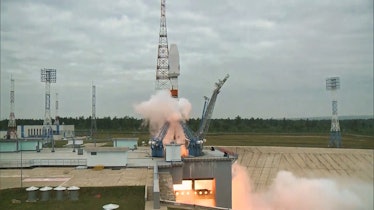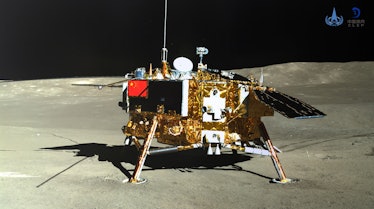The south pole of the Moon simply is likely to be the most popular actual property within the Universe proper now. Almost each nation with an area program has its eyes set on establishing a presence on the lunar floor’s south aspect. NASA, for instance, is presently in the midst of its Artemis marketing campaign, set to culminate with a everlasting U.S. settlement there, and India, Russia, and China are all inching their strategy to our neighboring celestial physique.
If this appears like deja vu, you’re not unsuitable. The unique “house race” — a fierce battle between the U.S. and the Soviet Union over who had the expertise to beat the cosmos first — started with the launch of Sputnik 1 and culminated with the U.S. touchdown the primary crewed spacecraft, Apollo 11, on the moon. However now, over 50 years later, we could also be getting into a wholly new period of house exploration, one which appears poised to return with a race of its personal.
Earlier this month, at a press convention at Kennedy House Middle for NASA’s Artemis II mission, NASA administrator Invoice Nelson expressed concern that if China’s house company beat NASA to a crewed Moon touchdown, China would possibly deny different nations entry to touchdown websites and water ice.
“The house race is de facto between us and China,” stated Nelson. “And we have to defend the pursuits of the worldwide neighborhood.”
Inverse talked with house coverage professional Ian Christensen of the Safe World Basis, who is also concerned in “twice-yearly casual, off-the-record dialogues with the U.S. and Chinese language house sector actors,” about why the U.S. and China are gearing up for a brand new “house race,” what precisely is at stake, and the way it’s more likely to play out.
Why We’re Racing to the Moon Once more
NASA and the China Nationwide House Administration (CNSA) appear to be eyeing a few of the similar touchdown websites for Artemis III and Chang’e-7, a CNSA mission to discover the Moon, together with touchdown on its floor, deliberate for a 2026 launch.
That’s not terribly shocking. The Moon’s southern craters are a really perfect location for a lot of causes. First, the realm gives a near-perfect touchdown website: a excessive, flat floor with good lighting. The assets round it additionally make it potential to arrange a everlasting base on the moon. A close-by crater accommodates an ice deposit giant sufficient to show the frozen water into rocket gas and breathable oxygen — two assets which can be crucial to establishing long-term bases on the Moon and ultimately offering logistical assist for missions to Mars. And that’s one thing each nations are decided to do.
NASA selected 13 potential websites for the Artemis III touchdown, however China’s house company has its eye on a number of of the identical websites for Chang’e 7.
NASA
All of this, on some stage, is about energy.
“House just isn’t separable from diplomatic comfortable energy,” says Christensen. (“Comfortable energy” refers to wielding affect fairly than army would possibly or monetary leverage.) “The State Division and NASA have tried to leverage house as a part of U.S. worldwide diplomatic methods. China does the identical factor; they do not have fairly the model id, however they actually deliver house into diplomatic and commerce agreements.”
Home coverage may have one thing to do with it. The concept of an area race hearkens again to the Chilly Warfare, and that’s politically expedient for each nations, a minimum of in some methods.
“There’s one thing of an ‘Apollo hangover’ within the U.S.,” says Christensen. “The concept competitors with the Soviets led to this great achievement, and we wish to recapture that type of atmosphere. I believe there is definitely a component of that in there.” The concept of a competitor may additionally give the U.S. house program a way of urgency.
In the meantime, Christensen says, “The Chinese language ecosystem is actually motivated at a sure stage by attempting to keep up its fame as an area energy,” and protecting tempo with the U.S. is a key a part of that.
A New Race, a New Rival
What about our previous Chilly Warfare “house race” rival, Russia? Nelson primarily dismissed Russia as a competitor within the present race to the Moon. He cited a protracted historical past of U.S. and Russian cooperation in house (though that, too, has been strained since Russia invaded Ukraine). However he additionally made it clear that Russia simply isn’t able to compete:
“I do not assume that lots of people at this level would say that Russia is definitely able to be touchdown cosmonauts on the Moon within the timeframe that we’re speaking about going to the Moon, or that probably China can be,” Nelson stated.
As if to show Nelson’s level, Russia’s Luna-25 lander crashed throughout an try to land close to the Moon’s south pole on August 19. Luna-25 had been neck-and-neck with India’s Chandrayaan-3 lander within the race to change into the primary spacecraft to land close to the Moon’s south pole.
The crash is an embarrassing political setback for Russia, whose president Vladimir Putin touts the nation’s house program as proof of Russian energy, each to his personal individuals and to different nations.


Luna-25 launched on August 10.
Xinhua Information Company/Xinhua Information Company/Getty Pictures
Regardless of Putin’s ambitions, although, it’s been greater than 30 years since Russia was an actual house energy. In recent times, Roscosmos has principally been within the enterprise of ferrying astronauts and provides to the Worldwide House Station (and even that hasn’t gone so effectively currently). The company has been engaged on a shoestring price range for many years. Cash — and entry to {hardware} — has gotten even tighter since Russia invaded Ukraine in early 2022, triggering waves of worldwide sanctions, together with from a few of the nations that had been initially slated to offer digital elements for Luna-25.
With Luna-25 now a pile of scrap on the lunar floor, it appears to be like like India could beat Russia — and everybody else — to the south pole of the Moon. However for NASA, China stays the competitor to observe: the nation is a powerhouse financial, political, and ideological rival to the U.S. right here on Earth, and (in contrast to Russia) it has each cash and political will to throw behind a race to the Moon.
No One Owns the Moon
So how will the brand new lunar “house race” unfold? Neither the U.S. nor China (nor anyone else) can simply plant a flag and declare that they personal Shackleton Crater. Each nations have signed the Outer House Treaty, which says that celestial our bodies just like the Moon and Mars can’t be claimed as nationwide territory.
Alternatively, you actually can’t land your spaceship on prime of any person else’s astronaut encampment or robotic lander. The U.S. and China agreed, by signing the Outer House Treaty, to not trigger “dangerous interference” with one another’s operations, which undoubtedly consists of not touchdown a rocket on them. What’s much less clear is how a lot room one nation is obligated to present one other nation’s touchdown website, for instance.
Finding out that type of element goes to be an enormous problem within the years forward, and communication between the U.S. and Chinese language governments shall be key to figuring out these points — and perhaps even setting the precedent that can outline how nations work together on the Moon, on Mars, and within the asteroid belt.


Photograph taken by the rover Yutu-2 (Jade Rabbit-2) on Jan. 11, 2019 exhibiting the lander of the Chang’e-4 probe.
Xinhua Information Company/Xinhua Information Company/Getty Pictures
The query, says Christensen, is, “Do we’ve got the traces of communication between these two states to determine deconfliction mechanisms or to share data on actions being carried out in order that we do not stumble into some type of inadvertent disaster factors?” However the two nations’ strained relationship right here on Earth might make that troublesome.
“We have seen type of a problem in establishing communication channels in different domains of operations, so I believe there’s some concern that that can proceed within the house area,” says Christensen.
Navigating Across the Communications Barrier
U.S. legislation really forbids NASA to speak to China’s house company. An modification to a 2011 appropriations invoice, known as the Townsend modification, prohibits direct discussions between NASA and Chinese language officers.
As a substitute, says Christensen, conversations on coordinating and minimizing battle on the Moon should occur in massive, multinational boards just like the UN Committee on the Peaceable Use of Outer House or the Worldwide House Exploration Coordination Group, or in what Christensen describes as “casual dialogues between stakeholders on either side.” These are principally discussions in regards to the broad strokes of every nation’s objectives and rules — not establishing guidelines of the highway for future lunar settlements.


“We’re not searching for agreements, and we’re not searching for any type of cooperation; we’re simply trying to have some very fundamental type of higher understanding of particular person and cultural logic,” says Christensen. “It is a type of oblique and sluggish course of.”
And there are different methods to work across the Townsend Modification. The U.S. and China have managed to swap scientific data a number of occasions previously, buying and selling observations from NASA’s Lunar Crater Remark and Sensing Satellite tv for pc (LCROSS) for knowledge from China’s Chang’e missions.
“I believe we needs to be searching for extra alternatives to do this: round pattern makes use of, bodily characterization of the regolith, issues like that,” says Christensen, “in order that some restricted fundamental scientific knowledge alternate can happen and assist us have some connections.”
Pressure, However Not Battle
Issues between the U.S. and China are already tense, and that’s going to make us awkward lunar neighbors at finest. And there’s an excellent probability that disputes over lunar touchdown websites might add stress to the already strained relationship between the U.S. and China right here on Earth.
“There is a threat that it turns into one other level of rigidity on this bigger dynamic between the 2 states,” says Christensen.
However he doesn’t count on that rigidity to spill over into armed battle, both on the Moon or in regards to the Moon.
“I believe battle over the Moon might be unlikely within the foreseeable future,” says Christensen. “I do not assume we have but established the kind of integration of the Moon into broader economics and geopolitics to deliver into battle.”
Ultimately, Christensen says an area “race” in all probability isn’t the correct phrase and undoubtedly not a productive one. “I believe it places somewhat bit an excessive amount of significance on getting there first and detracts from a few of the extra long-term questions.”